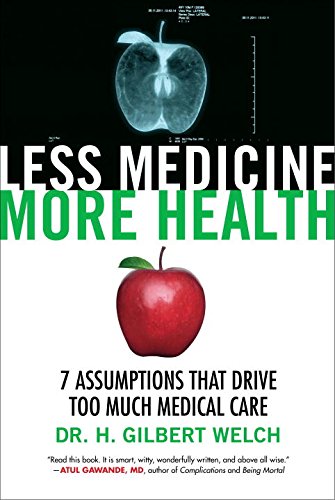
Less Medicine, More Health
7 Assumptions That Drive Too Much Medical Care
۷ فرضیه که مراقبتهای پزشکی بیش از حد را هدایت میکنند
کتاب های مرتبط
- اطلاعات
- نقد و بررسی
- دیدگاه کاربران
نقد و بررسی

December 15, 2014
A bright, lively discussion of the excesses of medical care to which patients often unwittingly go due to certain false assumptions.In a natural follow-up to his previous book, Welch (co-author: Overdiagnosed: Making People Sick in the Pursuit of Health, 2011, etc.), a primary care physician who teaches at Dartmouth Medical School, warns that too much medical care can be bad for your health. Patients and doctors are driven toward action by various forces-e.g., patients feel they are being paid attention to, which makes them feel better, and doctors like getting credit for trying if not for curing. The author lays out his argument around seven faulty assumptions too often made by the public: 1) All risks can be lowered; 2) It's always better to fix the problem; 3) Sooner is always better; 4) It never hurts to get more information; 5) Action is always better than inaction; 6) Newer is always better; 7) It's all about avoiding death. Drawing on history, scientific research, statistics and his own experience, Welch demonstrates the flaws in these assumptions. His stories involve the risks, uncertainties and harms of cancer screenings, treatments for heart disease, drugs, medical devices and surgical procedures. He makes an especially strong case for the risks of mass screenings for cancer-the fear, the false alarms, the overdiagnoses and the resulting overtreatments. Vivid images make what could be discouragingly technical quite understandable: Small, nonlethal tumors that need no treatment are "turtles," aggressive ones that have already spread and are beyond cure are "birds," and the ones that might be stopped by early treatment are "rabbits." In Welch's view, cancer screening can find "rabbits" but it creates the problem of overdiagnosis of "turtles" and offers little benefit to "birds." Welch's engaging style and touches of humor make this an easy read, and the facts he presents make a convincing case.
COPYRIGHT(2014) Kirkus Reviews, ALL RIGHTS RESERVED.

February 1, 2015
This insightful and at times even hilarious book by Welch (Dartmouth Medical Sch.; Overdiagnosed) examines the common assumptions that drive medical care and practice in America, with what he argues are results that are not always beneficial to the patient. These assumptions include that it is always good to have more information; treatment is better than inaction; it is better to do preventative screening; and new treatments are best. Welch shows how factors such as reimbursement, political influence, and pharmaceutical marketing can create pressures for the medical system to act, sometimes in ways that can harm the health of patients and their families. The author pokes clear, evidence-based holes in many common assumptions that are sometimes caused by patients' fears, lack of medical knowledge, or fear of inaction, and will help them think more clearly about the emotional and political factors that guide this country's medical industry. VERDICT General readers interested in health, health policy, and readable overviews of modern American medicine will find this book both enlightening and entertaining.--Aaron Klink, Duke Univ., Durham, NC
Copyright 2015 Library Journal, LLC Used with permission.

Starred review from February 1, 2015
Health-services researcher and teacher Welch continues hisin some circlescontroversial effort to convince the American public that more health care is not necessarily better health care. More important, he asserts, more health care may even be detrimental. Avoiding medical jargon, Welch speaks directly to the layperson and focuses on certain assumptions that have increased consumption in a market-driven society; some of which have become so ingrained by popular media that refuting them seems downright scandalous. But by debunking pet notions such as sooner is always better and action is better than inaction, he insists that physicians should not needlessly treat healthy people as if they were sick. He makes particular note of the myriad tests, screenings, and interventions that he feels serve only to make people's lives more stressful than healthy. The best medicine, he says, is that which intervenes least, saving its most effective interventions for acute illnesses. Welch's words, though wise beyond money, border on sacrilege in a country of generally healthy people who have developed an expensive health-care habit and who are expected to support a lucrative health-care industry. Welch's conversational style makes his prescription for better health an easy pill to swallow.(Reprinted with permission of Booklist, copyright 2015, American Library Association.)

























دیدگاه کاربران